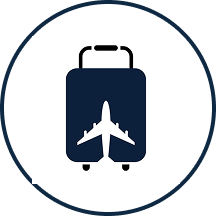
Airbus A350-900 Aircraft Overview & Seat Selection Guide

The Airbus A350-900 is a next-generation long-haul wide-body aircraft known for its advanced materials, fuel efficiency, and exceptional passenger comfort. Featuring a quieter cabin, higher humidity, and improved air pressure, it offers a superior in-flight experience in all travel classes. Whether you're flying economy, premium economy, or business class, understanding the A350-900 layout and seat differences can greatly enhance your trip.
1. Aircraft Overview
- Manufacturer: Airbus
- Range: Approximately 15,000 km
- Length: 66.8 meters
- Seating Capacity: Around 300–350 passengers (varies by airline configuration)
- Common Airlines: EVA Air, Singapore Airlines, Qatar Airways, Japan Airlines, Finnair, Cathay Pacific
- Typical Routes: Taipei–Los Angeles, Tokyo–Paris, Singapore–London, Hong Kong–New York
2. Cabin Layout & Seating Classes

Image source: Lufthansa
Business Class
- Most airlines use a 1-2-1 layout, ensuring direct aisle access for every passenger
- Fully lie-flat seats, often with sliding doors or semi-enclosed suites for privacy
- Ideal for long-haul travelers seeking comfort and discretion
Premium Economy
- Located around Rows 25–28, with a 2-4-2 layout
- The first row offers the most legroom; middle seats in Row 25 are especially spacious
- Seat pitch around 38 inches, width 19–20 inches; most include leg rests and adjustable headrests
- A great value for long flights without upgrading to business class
Economy Class
- Generally arranged in a 3-3-3 layout, some airlines use 3-4-3
- Seat width approx. 18 inches, pitch around 31–32 inches
- Row 31 is the first row in economy; it offers extra legroom but no window
- Lavatories are located in both the middle (around Row 40) and rear (Row 76), so seat selection can avoid high-traffic areas
3. Seat Location Details & Recommendations
Key Seating Areas
- Rows 25–28: Premium Economy with spacious seating; first row seats are the roomiest, especially 25DEFG
- Row 31: First row in Economy Class; large legroom but lacks windows
- Rows 25–39: Located over the wing, views are partially blocked and engine noise may be higher
- Row 39: Directly in front of mid-cabin lavatories—may not suit passengers sensitive to noise or foot traffic
- Row 61: Located behind an emergency exit; extra front space, but no window, and adjacent to the crew rest area
- Row 62 A/K: Window seats with no obstruction in front—among the best for scenic views
- Row 76: The last row; left side seats have no windows and right side is next to lavatories—generally not recommended
- All rows except 61 and 76 typically have windows. However, alignment varies—some windows are directly adjacent, while others are between seats
Recommended "true window" rows (may vary slightly by aircraft):
- 32, 37, 38, 64, 67, 68, 71, 75
4. Window View & Flight Direction Tips
- If you enjoy sunrise or sunset views, select window seats accordingly based on flight timing and direction
- For northbound flights:
- Morning: choose left side (A seats)
- Evening: choose right side (K seats)
- Morning: choose left side (A seats)
- For southbound flights: reverse the above
- Avoid rows over the wing (25–39) if you want an unobstructed view of the clouds or landscape
5. Current Airbus A350-900 (A359) Direct Flight Routes
Flight Number | Aircraft Type | Departure Airport | Arrival Airport |
|---|---|---|---|
JL327 | Airbus A350-900 | Tokyo Haneda Airport (HND / RJTT) | Fukuoka Airport (FUK / RJFF) |
SQ431 | Airbus A350-900 | Velana International Airport, Malé (MLE / VRMM) | Singapore Changi Airport (SIN / WSSS) |
OZ751 | Airbus A350-900 | Incheon International Airport (ICN / RKSI) | Singapore Changi Airport (SIN / WSSS) |
JX803 | Airbus A350-900 | Narita International Airport (NRT / RJAA) | Taiwan Taoyuan International Airport (TPE / RCTP) |
KE187 | Airbus A350-900 | Incheon International Airport (ICN / RKSI) | Taiwan Taoyuan International Airport (TPE / RCTP) |
6. Summary Tips
The Airbus A350-900 offers modern cabin design, quiet performance, and excellent long-haul comfort. By understanding the seating layout, key row locations, and view considerations, passengers can tailor their seat selection to match their needs—whether it's extra legroom, scenic views, or quick access for boarding and disembarkation.
Seat Selection Guide for Popular Airbus and Boeing Aircraft
- Airbus A380 Seat Map & Aircraft Overview
- Airbus A320 Seat Map & Aircraft Overview
- Airbus A350-900 Seat Map & Aircraft Overview
- Boeing 737 Seat Map & Aircraft Overview
- Boeing 747-400 Seat Map & Aircraft Overview
- Boeing 787-9 Seat Map & Aircraft Overview
- Airbus A320 NEO Seat Map & Aircraft Overview
- Airbus A321 NEO Seat Map & Aircraft Overview
- Airbus A380-800 Seat Map & Aircraft Overview
- Airbus A359 Seat Map & Aircraft Overview
- Airbus A321 Seat Map & Aircraft Overview
- Airbus A330-300 Seat Map & Aircraft Overview
- Boeing 787-10 Seat Map & Aircraft Overview
- Boeing 737 MAX Seat Map & Aircraft Overview
- Boeing 737-800 Seat Map & Aircraft Overview
- ATR72 787-10 Seat Map & Aircraft Overview
